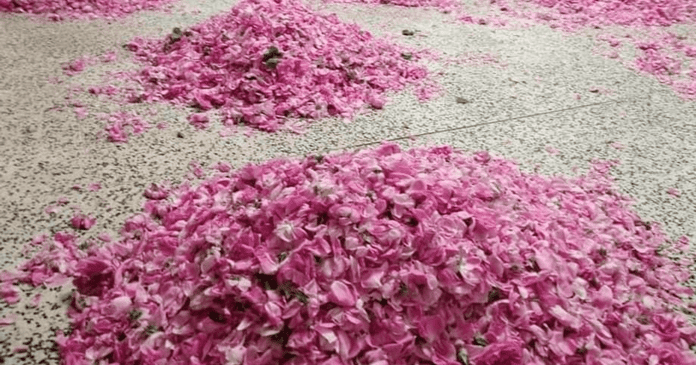Zainab Ahmed (37) told Sky News Arabia: “I spend my day picking roses in our village, Qasrnaba, and I buy quantities of them and process them into rose water or rose syrup, like my mother taught it to me and my grandmother accepted.”
And she adds: “There is a rose distillation machine in almost every house. Making rose water is part of our heritage.
And she concludes: “A kilo of roses produces half a liter of rose water, which we keep in glass bottles to resell on the local market.”
Qasrnaba is located in the Beqaa Valley, between the towns of Zahlé and Baalbek, 10 km from the first and 25 km from the second.
Qasrnaba is considered the capital of roses in Lebanon and produces 95 percent of the production, according to what was explained by the head of the department of agriculture of the governorates of Baalbek-Hermel of the Ministry of Agriculture in Lebanon, l agricultural engineer Abbas Dirani, in an exclusive interview with Sky News Arabia:
The Qasrnaba rose is known as the Damask rose, as it originated in the countryside of Damascus around 100 years ago. This rose tempted everyone who passed through the Levant, but it was the Crusaders who brought it to Europe. The French followed in the footsteps of the Crusaders during the Mandate period in the region in the first half of the last century, so they transferred it to France and included it in the composition of French perfumes. The “Juriyya rose” in Lebanon is characterized by a pleasant smell, in addition to its use in the composition of perfumes, and it is used in the manufacture of local confectionery, as well as in the perfuming of mosques and homes. Rose water and its oil have health benefits and are used in the formulation of certain medical treatments. Before the crisis, the city of Qasrnaba produced around 200 tons of roses each year, and the season was 30 days. There are obstacles in the face of this distinctive industrial agriculture which spans about 500 dunums of good agricultural land. Since the beginning of the crisis in Lebanon, production has accumulated, losses have increased, exports have stopped and the local market has become dependent on cheaper imported industrial oils which are used in local industries. Crises besieged production, and after the price of a kilo of roses hit $3, it fell to less than a quarter dollar. The town of Kasranba held the annual rose festival to market it, but the economic crisis hampered the marketing of the production, and it stagnated, and the factories began to blackmail the farmer in order to sell his stagnant production to low price.
Read the Latest World News Today on The Eastern Herald.


